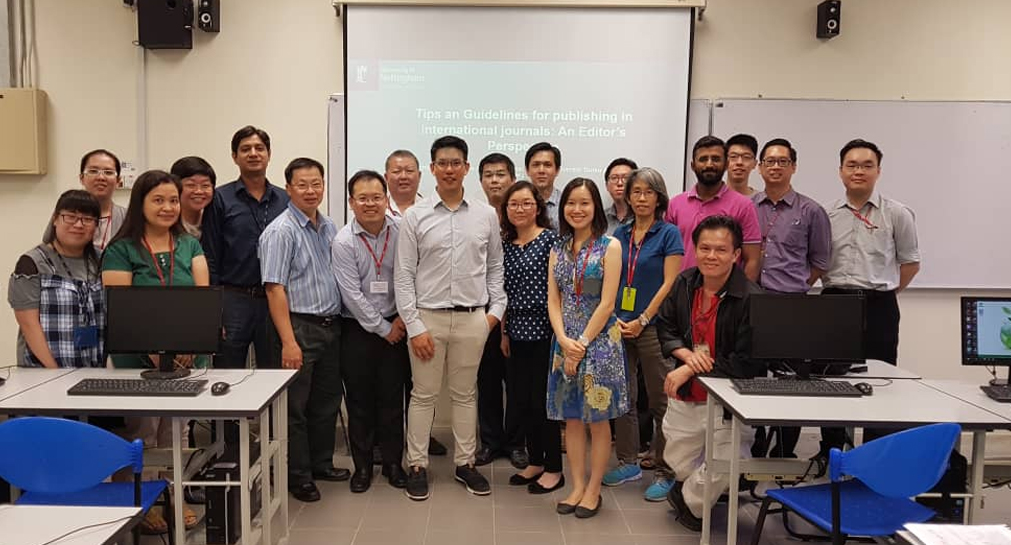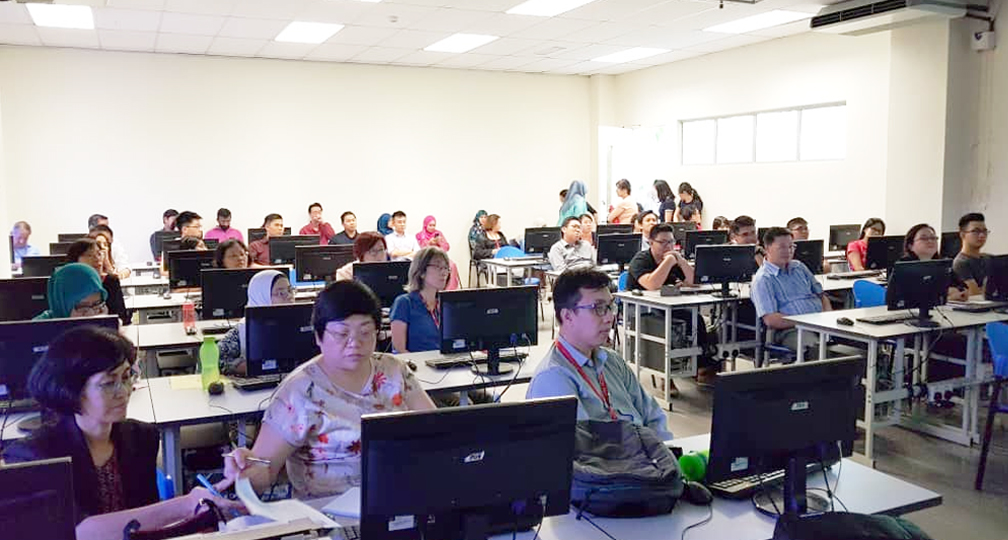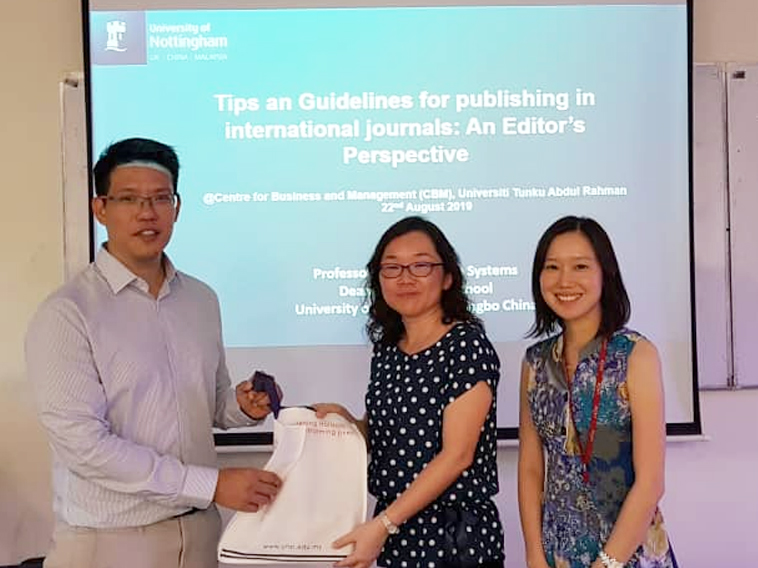

Prof Chong (centre) posing with participants after the talk
A talk titled “Tips and Guidelines for Publishing in International Journal: An Editor’s Perspective” was organised by Centre for Business and Management (CBM) on 22 August 2019 at UTAR Kampar Campus. Present were Faculty of Business and Finance Deputy Dean for R&D and Postgraduate Programmes Dr Lau Lin Sea, CBM Chairperson Assoc Prof Dr Lee Voon Hsien, staff and participants.
The objective of the talk was to enable participants to obtain important information from the experiences shared by the invited speaker, Prof Alain Chong Yee Loong, who is also currently the co-editor in Chief for Industrial Management & Data Systems (Emerald, Clarivate Analytics; SCIE; JCR-2018; IF-3.727; ABS Level 2). He also shared some insider knowledge and pointed out key questions to help participants develop papers that will interest good journals.
Apart from the known facts as to why academics publish their researches, Prof Chong reminded the participants of their role as educators. “No doubt we want to share knowledge with other people about the researches we have done, but as educators, we are also sharing information with students, especially postgraduates,” said Prof Chong. He advised participants to consider recruiting the help of postgraduates in a research project because they make good team members, have so much to contribute, and they are able to expand the research community in an educational institution.
Participants also recalled the importance of having publications in top journals because, as mentioned by Prof Chong, top journals boost research impact, career advancement and university ranking. For certain researchers, he spoke of having publication in top journals as a good way to secure employment. Other benefits also included monetary award and enhancing annual appraisal.
When choosing the right journal for submission, Prof Chong advised participants to consider how the journal will enhance the impact of the research and one’s reputation. He asked participants to also consider if the journal can reach the target audience that the researcher intend to reach.
“Identify a few possible target journals but you need to be realistic with your choices. Follow the author guidelines. You can check the author guidelines from the publisher’s website. If possible, try reading at least ten papers of the publication, and see if your research fits the journal. You may also want to consider including a cover letter because it can act as an opportunity for you to speak directly to the editor and to convince them of the importance of your manuscript to the journal,” explained Prof Chong.
“What do editors and reviewers actually look for? This is a question you need to ask for yourself. From my experience, we consider if the topic is important or interesting. We look at the contributions of the research and its relevancy in extending existing knowledge. We consider its research methodology and if the conclusions are valid or objective. The clarity, structure and quality of the writing are equally important because it must be able to be communicated well. We also examine your sound logical progression of the arguments, as well as the relevancy of your research at an international level. Editors are always dealing with matters of fit, which meant to say that even if your article may be excellent, several factors may render it not a good fit,” explained Prof Chong.
“We are too close to our own work to identify its flaws. My advice is to have your own peer review before you submit the paper. By that I mean have your friends review your research and ask them for constructive criticism to improve your paper. For myself and my research team, we would usually present our papers to three to four renowned professors or editors before submitting. It is also important to always proof-check our paper thoroughly,” advised the speaker.
Though he understood that rejections are not easily accepted, Prof Chong mentioned that rejections of submission are normal in the research field. He also spoke of these rejections as opportunities to review one’s research again to find ways to improve the work and gain valuable feedback. He mentioned that it could also be a good experience of how the system works.
When asked of the rejection factors, he listed the following as the cause of rejections – research on poor problems, weak theoretical development, lack contribution, poor methodology, too descriptive, poor positioning. He encouraged participants to choose interesting topics, and while minimising references, he also advised participants to use references to their advantage.
At the end of the talk, Prof Chong advised participants to attend conferences, especially those that are very much related to their field of research. He explained that these conferences are important not only to build networks with other researchers, but it also allows people to know one’s own research team and research work. He also mentioned that conferences are one of the best places to present one’s interesting researches or projects.
“Consider your strength and competitive advantage, and if possible try collaborating with up and rising professors. Ask yourself what you can offer to this collaboration and research. There could be interesting cases or interesting data that you find useful,” advised Prof Chong.
The talk ended with an interactive Q&A and a souvenir presentation by Dr Lau to Prof Chong.

Participants listening attentively

Dr Lau (centre) presenting a token of appreciation to Prof Chong while Dr Lee (right) looks on
© 2019 UNIVERSITI TUNKU ABDUL RAHMAN DU012(A).
Wholly owned by UTAR Education Foundation Co. No. 578227-M LEGAL STATEMENT TERM OF USAGE PRIVACY NOTICE